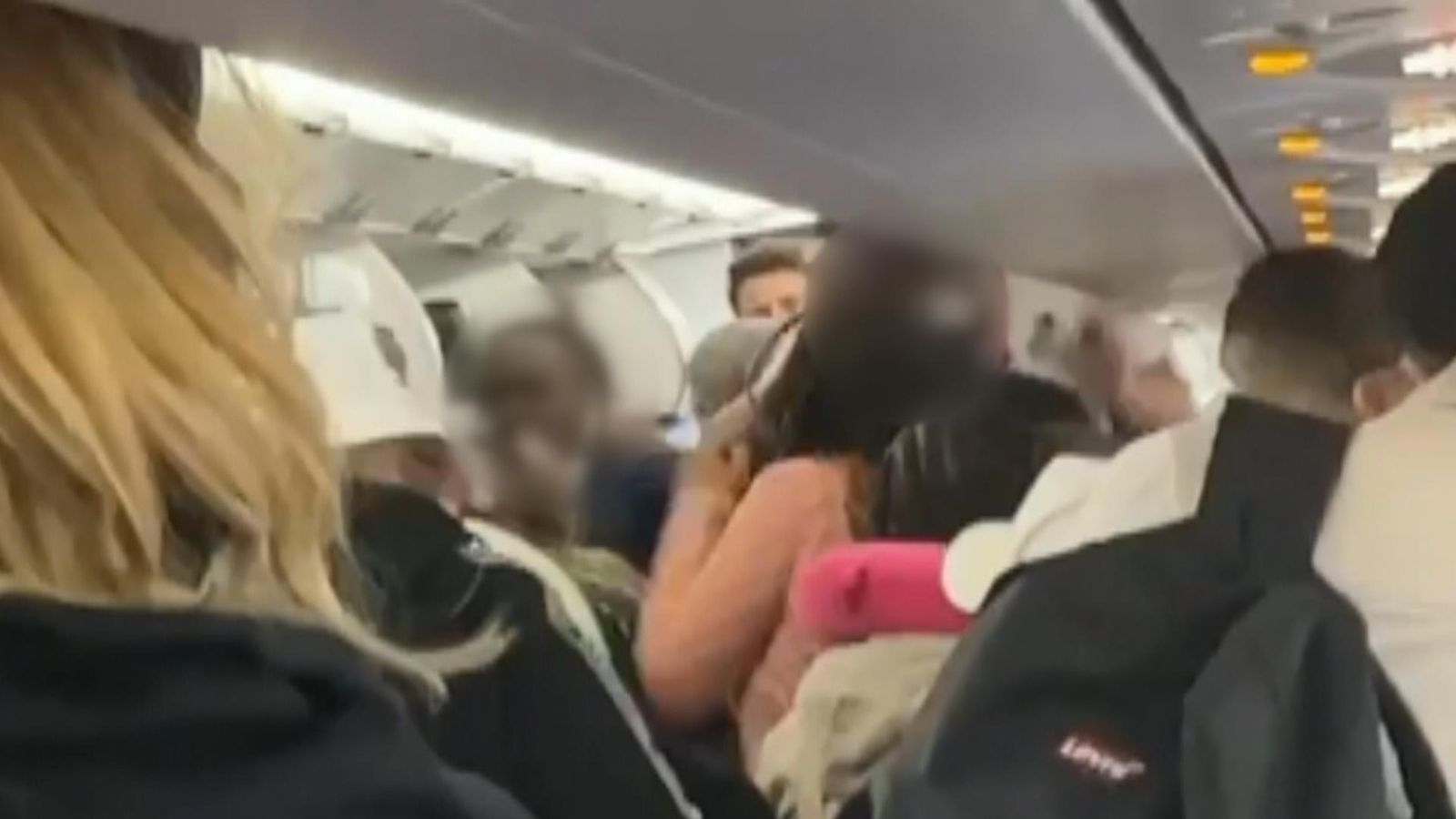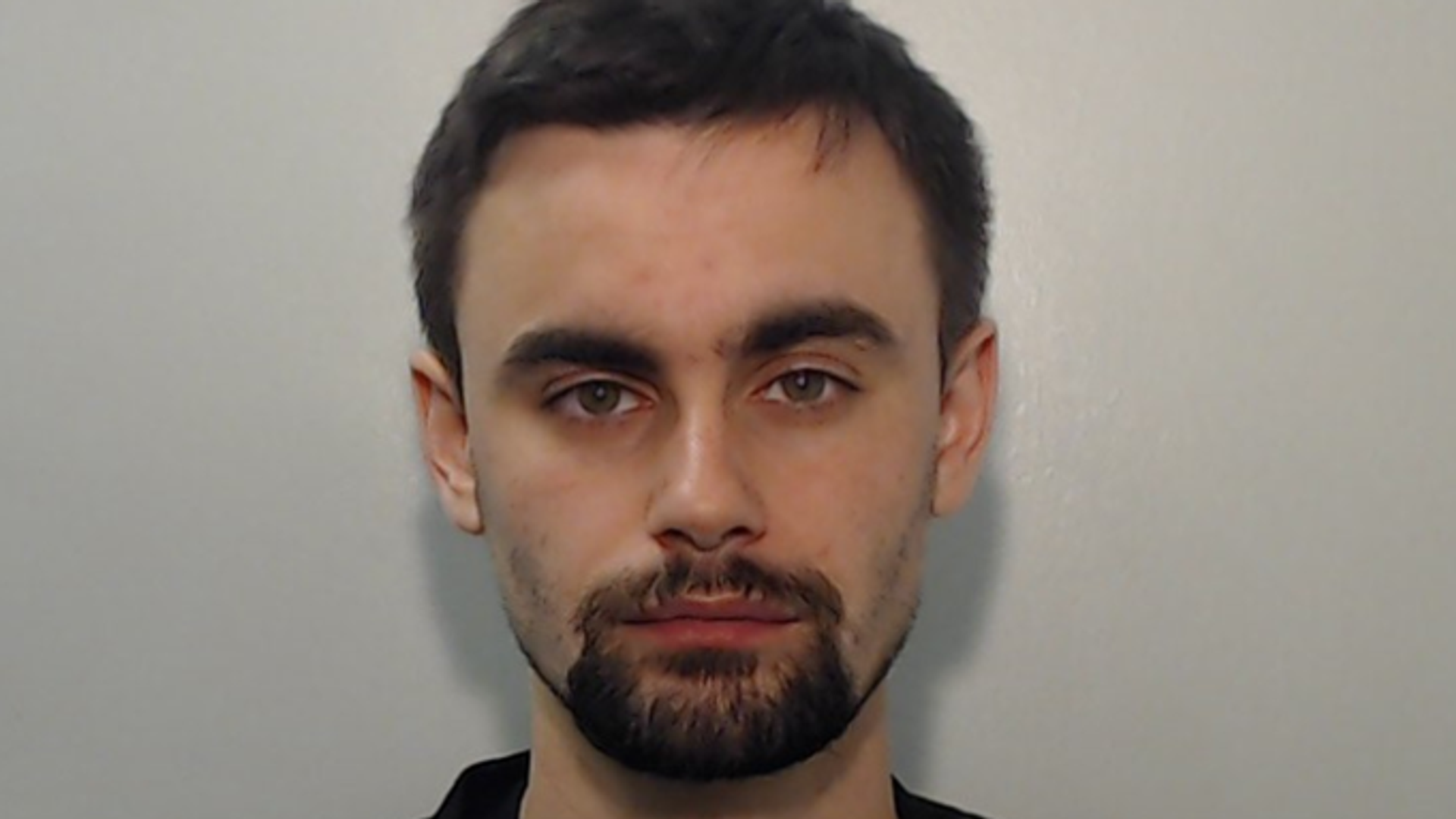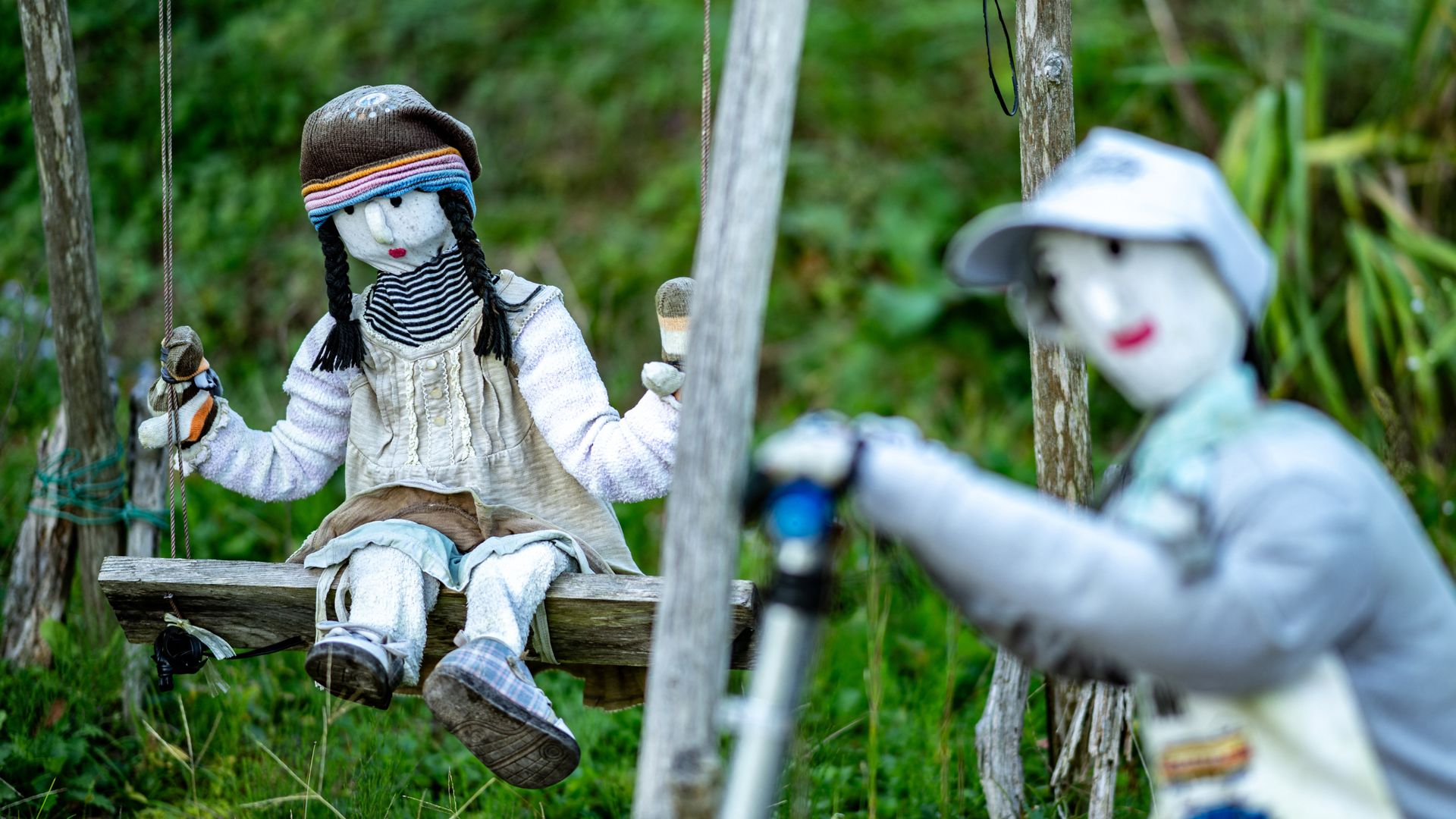Mass brawls, sexual assaults, physical violence, drunken threats, verbal abuse, passengers stripping off: all examples of the kind of disruptive behaviour experienced by cabin crew in recent years.
New figures exclusively shared with Sky News show 1,028 cases were reported by UK airlines in 2022 – nearly triple the number reported in 2019. Next week, in a bid to reduce those numbers, MPs will be considering a new law that could see offenders banned from all British carriers.
Many incidents of so-called “air rage” have been documented by shocked fellow travellers on social media.
One example from August last year shows seven people having to restrain a heavily intoxicated man filmed shouting and swearing at fellow passengers on a flight from Luton to Lithuania.
In another, last May, footage from a plane which had just landed in Crete from Gatwick shows passengers gasping in horror as a drunken fight broke out in the aisle – and one of the pilots was seemingly punched trying to break up the melee.
During a flight from Manchester to Turkey in July 2022, a man was filmed stripping down to his underwear and drunkenly shouting “people are scared of me, I wonder why”.
In 2019, two RAF jets were even scrambled to escort a plane back to Stansted after a woman assaulted cabin crew, threatened fellow passengers and attempted to open the aircraft door mid-flight.
Which short-haul airline was ranked UK’s worst for delays last year?
This short-haul airline was ranked UK’s worst – with passengers urged to avoid it if they can
British Airways reveals first uniform change in 20 years
Cabin crew are trained to deal with these cases – but they can take a heavy toll.
“You’re up there at 38,000ft with 300 passengers and 16 crew, and you have to manage and deal with the situation on your own,” one former air steward said. “It can leave a very long-lasting impact. We’re all human at the end of the day.”
Ben (not his real name) recently left his job after 20 years working as cabin crew.
He is speaking to us on condition of anonymity because industry contracts typically restrict staff from speaking to the media.
Ben had to restrain drunken, aggressive passengers in handcuffs on two separate occasions. The first involved a man who sexually assaulted a woman – and then attempted to hide in a galley freezer cabinet.
“The passenger was intoxicated and had taken some sort of medication about three hours into the flight,” Ben said. “He was increasingly erratic. We tried to calm him down but the situation became aggressive and uncontrollable.
“A decision that we don’t take lightly was made to restrain him. We had to physically grab his arms and put the cuffs on. He was being very vocal, shouting and swearing, which was very offensive.”
Be the first to get Breaking News
Install the Sky News app for free
One of Ben’s colleagues later received counselling due to the distress caused by the incident.
On another flight, this time to Nigeria, passengers complained about a man who had been drinking excessively.
“He was very, very drunk. We later found out he had been drinking from his own bottle as well. We were able to cuff him, but he was moving around a lot, swearing, kicking and stamping in his seat.”
Ben believes more should be done to protect passengers and crew from these incidents.
“I’d like to see the law tightened, and possibly a national register shared amongst all the airlines, so they can be made aware of what a passenger has done before. People just think they can get away with it. They cause so much stress and heartache.”
UK airlines have a mandatory duty to report cases involving intoxicated, violent or unruly passengers to the Civil Aviation Authority (CAA) for safety reasons.
In 2019, 373 incidents were reported, a figure consistent with the numbers over the previous few years. But while those obviously fell during COVID, last year there were 1,028 cases – triple the pre-pandemic figure.
It’s thought the increase is largely down to better reporting from one specific airline, and the impact of mask requirements.
But the Conservative MP for Dartford, Gareth Johnson, believes the law needs to change to deal with the increasing numbers. He’s introducing a 10 Minute Rule Bill on the issue on 24 May.
“This bill aims to ensure that violent people who cause mayhem on aeroplanes are actually banned from flying for a specific period of time by a court,” Mr Johnson said.
“The difficulty that we have currently is that someone can be violent on a particular operator’s aeroplane and then that operator cannot pass that information on to another operator. So that person can just go and fly with a different operator.
“At the moment violence is very rare, but if you introduce this legislation, this will make it even less likely to happen. It is right that people can be banned from driving, they can be banned from being a company director and they can be banned from football matches. The same should apply for people who behave violently on planes. This power exists in other countries and should be available here too.”
In 2018, the government considered plans to restrict the sale of alcohol at UK airports in a bid to crack down on the problem. They concluded the resulting consultation did not generate enough evidence that doing so would be a “proportionate way to address the issue of drunk and disruptive passenger behaviour … but we do think that other action is needed”.
Currently, drunken passengers can face fines of up to £5,000 and two years’ imprisonment. Airlines can also attempt to recoup some of the costs of diverting a plane to a different airport, typically ranging from £10,000 to £80,000.
But that is often impossible. Paul Charles, a former director at Virgin Atlantic, said the problem is hugely expensive for airlines.
“The costs run into millions across the airline industry from disruptive passengers. They’re facing potentially higher fuel bills by having to divert an aircraft to a different airport. They’re facing the costs potentially of paying out all passengers on board because of a delay. That’s longer than three hours to that particular flight and its arrival time.
“It also creates a knock-on impact for the rest of the day’s schedule for an airline. So let’s say there’s disruption in the morning which leads to a flight delay of three or four hours, potentially. That then knocks on to other flights where that aircraft should be flying.
“And of course, that then affects thousands of other passengers who are relying on that aircraft to be on time. The costs are widespread because they’re not just about the costs on board an aircraft where that passenger is being disruptive, but other aircraft and airports too.”
A spokesperson from the Department for Transport said: “All passengers and crew have the right to feel safe when travelling by air. There is already robust legislation and powers to deal with disruptive passengers, including bans, fines and removal from flights.”
Anna Bowles, head of consumer at the CAA, added: “Passengers who are rude or aggressive can be highly disruptive and distressing for cabin crew and fellow travellers. This type of behaviour is completely unacceptable and can pose a risk to aircraft safety.
“The aviation industry undertakes a range of measures to tackle this issue and passengers could face criminal charges with severe penalties, even prison, for incidents involving aggressive behaviour.”











